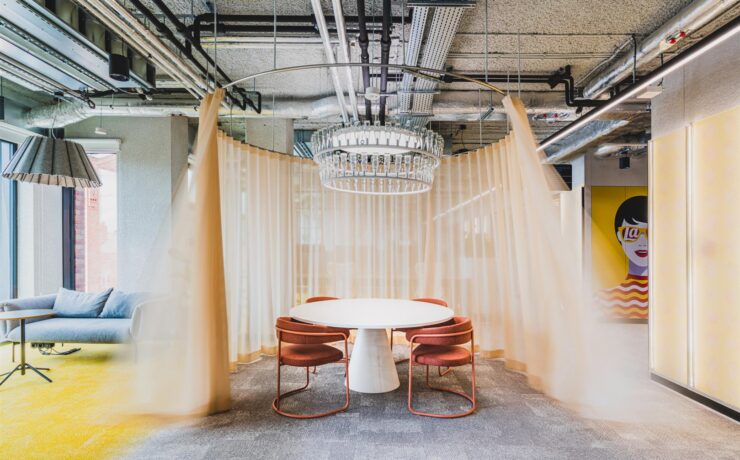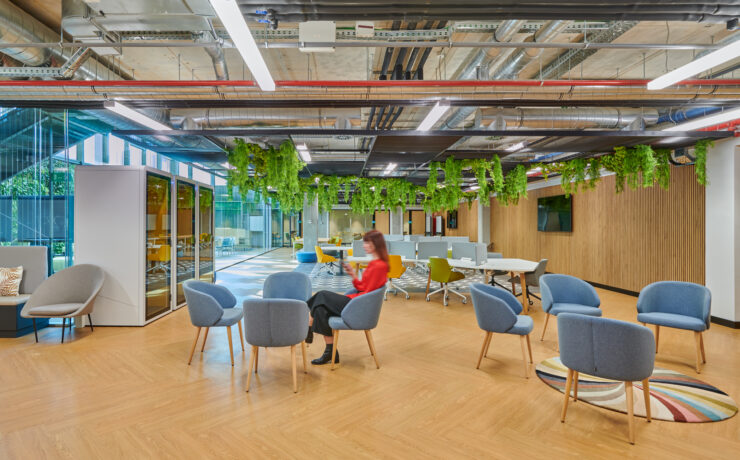Today, businesses are facing critical challenges in labour shortages and supply chain disruptions, heightened by the energy crisis and rising costs. In response, many organisations are reassessing their real estate strategies in order to control expenses while creating an attractive environment for retaining talent and growing their business.
JLL’s Top 10 Global Commercial Real Estate Trends research reveals how companies are adapting their workspaces to stay resilient in unpredictable markets.
Here are the 10 key trends in commercial real estate this year:
01. Real estate that supports hybrid working
Hybrid work is now a non-negotiable element of the workplace. 56% of organisations prioritise establishing agile, flexible work models by 2025, with real estate a vital part of strategy. Businesses will need to reconfigure their workspaces and align technology and HR policies to meet new employee preferences for working seamlessly across the office, home and third places.
02. Optimising workspace for the people
With 75% of employers facing challenges in attracting top talent, more organisations plan to invest in workplace design that meets the evolving needs of today's workforce.
“Rather than focusing solely on short-term cost benefits, leaders are increasingly adopting a long-term, ‘people-first’ mindset that prioritises employee engagement and well-being,” says Stephanie Bonduelle, Client and Brand Director at Tétris.
Strategies include incorporating more flexible space and dynamically managing space demand to strike a balance between real estate costs and a better employee experience.
03. Digital technologies to transform building operations
Seven in ten organisations agree that advanced technologies are a top priority in optimising their real estate. Technologies such as AI and smart sensors can improve building performance by enhancing energy efficiency, reducing costs through predictive maintenance, and providing deeper insights to enhance employee experience. “By leveraging these digital tools, businesses can adapt quickly to continuous change and deliver return on their real estate investment,” says Stephanie.
04. Maturing data analysis to drive decision-making
43% of organisations plan to accelerate investment in data analytics and 56% will use data science by the end of the year. These maturing data collection and analysis capabilities will provide sophisticated, reliable insights into how real estate is being used, allowing real-time decision-making to optimise the workplace and create value. “The metrics that come into use will go beyond stakeholder needs and efficiency measures to include non-financial metrics that encapsulate – and help transform – the employee experience,” says Stephanie.
05. Holistic wellbeing in workplace design
As the employee experience becomes an increasingly important business priority, companies will look to improve all aspects of wellbeing in the workplace. Nearly half have already implemented inclusive design that enhances social wellbeing, while 43% plan to increase investment in healthy spaces and amenities to promote physical wellbeing. To address mental wellbeing, companies will need to establish policies that encourage employees to pursue personal resiliency.
06. Location decisions based on neighbourhood amenities
To attract and retain people, companies increasingly want offices in places where people can socialise, shop, live, work and eat. These location decisions will also drive the development of mixed-use spaces that contribute to more cohesive, vibrant neighbourhoods. “By situating themselves in a well-connected, safe and healthy community with green spaces, companies can offer employees a higher quality of life and increase attractiveness to talent,” says Stephanie.
07. Stronger action to address real estate emissions
As energy-related emissions from buildings continues to rise, businesses are increasing efforts to improve their energy efficiency, including paying a premium to lease green buildings. Nearly 40% plan to accelerate investment into fit-outs and refurbishments based on circular design principles, while at least 80% are partnering with landlords on renewable energy strategies. By 2025, 90% of corporate real estate leaders will be on track to reduce operational energy use.
08. Sustainable sourcing
As companies face rising pressure to improve their impact, many are examining how their procurement practices can be more sustainable and responsible. Companies will need to consider environmental, ethical and social factors – including the diversity and inclusion practices of suppliers – in sourcing services, supplies and real estate works. Responsible procurement is an important way for companies to minimise risk, stay competitive in an increasingly eco-conscious market, and ensure that their core sustainability goals are reflected in their supply chain.
09. Redefined partnerships across the real estate ecosystem
Outsourcing real estate services will support companies transitioning to a low-carbon, sustainable and equitable environment. About 40% of businesses plan to partner with external experts to provide health and wellbeing amenities and improve real estate sustainability, while 43% plan to rely on outsourced support for renewable energy supply and real estate technologies. By leveraging these specialist skills, companies can meet real estate goals while controlling costs.
10. Investing in locations to access new talent pools
As innovation and talent clusters form in cities across the world, companies are increasingly choosing office locations where they can best access new talent. 39% of real estate leaders are reallocating their real estate footprint to gain access to vibrant markets from Beijing and Paris to Leeds and Nashville. With half of CEOs expecting labour shortages to impact their business strategy in the short-term, the need to attract talent key talent is more vital than ever. Accessing the global talent pool is becoming a crucial way to accelerate innovation.
In a fast-changing business landscape, adaptability is crucial for companies to thrive. Learn more about the trends shaping workplaces and real estate management in JLL’s Top 10 Global CRE Trends 2023.





